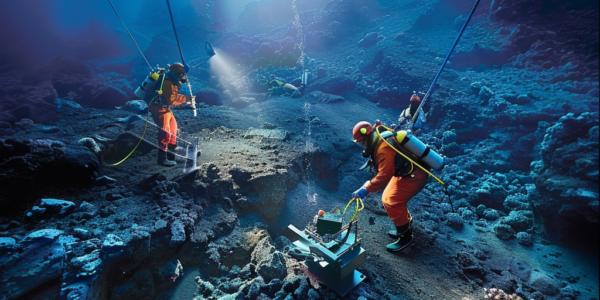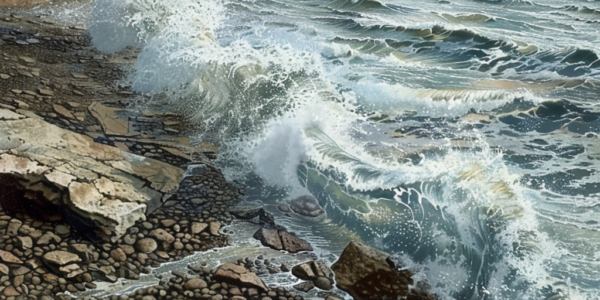Researchers Discover Largest Volcanic Eruption in Recorded History
The largest volcanic eruption in recorded history occurred 7300 years ago off the southern coast of Japan, as a team of researchers has recently discovered. The Kikai-Akahoya eruption, originating from a submerged caldera near the Japanese island of Kyushu, ejected an astonishing amount of material, estimated at around 70 cubic kilometers, significantly surpassing the eruption of Mount Tambora in 1815. Now, Nobukazu Seama and his team from Kobe University in Japan have conducted a seismic survey to map the underwater region around the caldera, situated approximately 200 meters below the surface. Their findings have revealed that the Kikai-Akahoya eruption released over 300 cubic kilometers of material, equivalent to twice the volume of water in Lake Tahoe, a substantial increase from previous estimates. The researchers’ efforts have provided valuable insights into the magnitude of the Kikai-Akahoya eruption, shedding light on its profound impact on the surrounding environment and human populations.
Revolutionizing Catalyst Development with AI and Automated Lab Infrastructure
Artificial intelligence and automated laboratory infrastructure are revolutionizing the development of new chemical catalysts. Researchers at ETH Zurich have utilized these tools to efficiently synthesize the energy source methanol from CO2. With advanced infrastructure, the team successfully developed approximately 150 catalyst compositions for producing methanol from CO2 in less than six weeks, marking a significant time-saving compared to conventional methods. The researchers have published two papers on their method, highlighting the potential of methanol as a key element for a sustainable hydrocarbon economy.
Massive Ancient Tsunami Uncovered in Western Canada
University of Saskatchewan researchers make groundbreaking discovery of evidence of a massive tsunami that swept across ancient sea covering Western Canada and northern United States 445 million years ago. Dr. Brian Pratt and Dr. Colin Sproat shed light on this ancient natural disaster, providing valuable insights into the geological history of the region.
Physicists Make Groundbreaking Discovery in Study of H2+ Molecule
Physicists from Heinrich Heine University Düsseldorf (HHU) have made a groundbreaking discovery in the study of the simplest molecule, H2+. The molecule, which is composed of two hydrogen nuclei and one electron, has long been a subject of interest for astrophysics and fundamental physics due to its significance in the early formation of the universe. Published in Nature Physics, the study details the team’s successful measurement of the molecule’s vibrations using a laser, marking the first direct observation of such behavior. The findings closely align with theoretical predictions, shedding light on the elusive nature of H2+.
Revolutionary ‘Artificial Leaf’ Technology Converts Solar Energy into Hydrogen Fuel
Scientists have unveiled a revolutionary ‘artificial leaf’ technology that converts solar energy into hydrogen fuel through direct water splitting. This innovative approach offers enhanced efficiency, cost-effective production, and global implications for sustainable energy solutions. The use of recyclable materials and low-melting-point metals points to a cost-effective and scalable approach for manufacturing solar energy conversion devices, potentially revolutionizing energy systems worldwide.
LIFE Space Mission Study Shows Potential to Detect Traces of Life on Exoplanets
Physicists at ETH Zurich and the University of Zurich have conducted a study to determine whether the planned LIFE space mission could detect traces of life on other planets. The study, published in The Astrophysical Journal, utilized our own planet as a test object to demonstrate the mission’s potential success. The LIFE (Large Interferometer for Exoplanets) initiative, led by ETH Zurich, aims to use a network of five satellites to detect traces of life on exoplanets. These satellites will form a large telescope close to the James Webb Space Telescope, allowing for the observation of Earth-like exoplanets and the deduction of their composition and atmospheres based on infrared thermal radiation.
Study Reveals Glitter’s Impact on Aquatic Plant Growth
Recent study reveals the concerning impact of glitter on aquatic plant growth, as the metal coating on glitter reduces the amount of light penetrating water bodies, impairing photosynthesis in the Large-flowered waterweed Egeria densa. Glitter, often made of microplastics and metals, is a common pollutant in rivers and seas, accumulating in aquatic environments. The research focused on the effects of glitter on E. densa, an important macrophyte native to South America, highlighting the potential harm that glitter can cause to aquatic plant life.
Arrowhead Games CEO sparks debate with controversial statement on Nvidia’s DLSS
The CEO of Arrowhead Games sparked a debate by stating that Nvidia’s DLSS is not necessary for Helldivers 2, raising questions about the importance of upscaling technologies in modern gaming. Despite the absence of branded upscaling tools, the game has garnered praise for its engaging co-op experience. With a focus on core gameplay, the CEO’s stance has stirred discussions about the necessity of advanced rendering technologies. While the inclusion of DLSS and FSR in Helldivers 2 remains uncertain, the developer’s focus on compelling content has resonated with the gaming community, highlighting the evolving landscape of gaming and the nuanced considerations in game development and optimization.
Julius Caesar’s Year of Confusion: The Reform of the Roman Calendar
Julius Caesar’s Year of Confusion, 46BC, was a pivotal moment in history. Caesar’s reform of the Roman calendar aligned it with the Earth’s rotation and orbit around the Sun, resulting in the longest year in history. Despite initial chaos, this period of change ultimately brought about a more organized and accurate way of tracking time.
Clash of Clans February Update Brings New Features and Enhancements
The Clash of Clans February update introduces the powerful Overgrowth spell, Progress Bars, Town Hall 16 upgrades, and various other enhancements. The update aims to enhance the gaming experience and engage players in exciting new ways, providing the tools they need to adapt to the evolving challenges of the battlefield and elevate their Clash of Clans experience to new heights.










